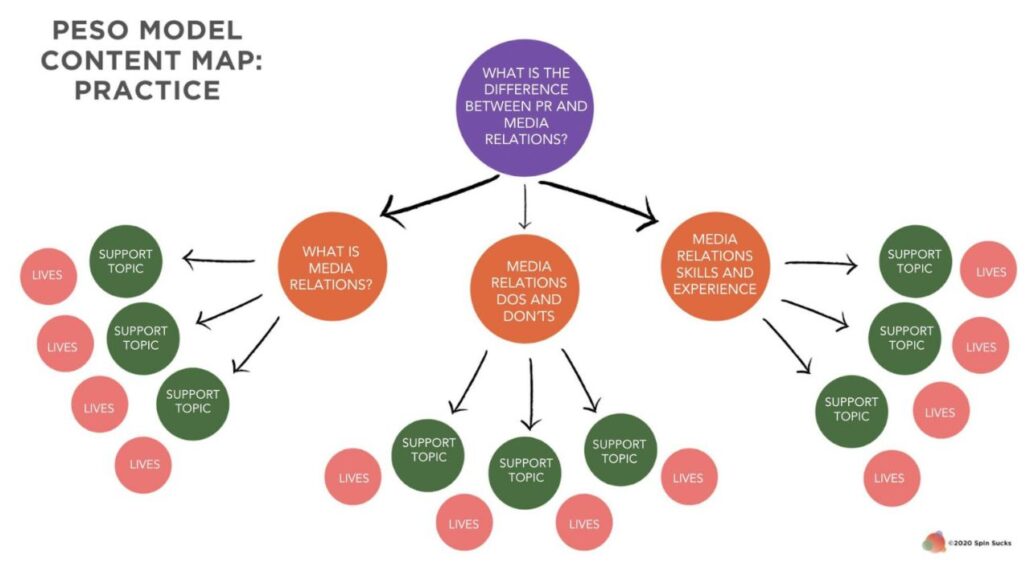The role of content in SEO (Search Engine Optimization) success is fundamental. High-quality, relevant, and well-optimized content is one of the most critical factors that search engines like Google consider when ranking web pages. Here’s a closer look at how content plays a pivotal role in SEO success
Relevance to User Intent:
Search engines aim to provide users with the most relevant results for their queries. Content that aligns with user intent is more likely to rank higher. To succeed in SEO, your content should address the needs and interests of your target audience.
Keyword Optimization:
Keywords are the phrases and terms users type into search engines. Properly researching and strategically integrating relevant keywords into your content can help search engines understand what your content is about. This, in turn, can improve your chances of ranking for those keywords.
Quality Content:
High-quality content is valuable to users and search engines. It keeps users engaged and encourages them to spend more time on your site, reducing bounce rates. Google’s algorithms consider user engagement metrics as indicators of content quality.
Freshness:
Updating your content regularly with fresh information can signal to search engines that your site is active and relevant. This can positively impact your rankings. Blogs, news sites, and other content-driven websites often benefit from this approach.
Link Building:
High-quality content is more likely to attract natural backlinks from other websites. Backlinks are a significant ranking factor, and when authoritative sites link to your content, it can boost your SEO success.
Mobile Optimization:
As mobile internet usage continues to grow, mobile-friendly content is crucial. Google considers mobile-friendliness as a ranking factor. Responsive design and mobile-optimized content ensure a positive user experience on mobile devices.
Structured Data:
Properly structuring your content with schema markup or structured data can help search engines better understand your content’s context. This can lead to rich snippets and enhanced search results, increasing your click-through rate.
User Experience:
Content plays a crucial role in the overall user experience. A well-structured and easy-to-navigate website with clear and informative content can improve user satisfaction and reduce bounce rates, indirectly affecting SEO.
The Content-Centric SEO Approach

Quality over Quantity: When it comes to content, quality always trumps quantity. Search engines like Google prioritize informative, engaging, and relevant content to users. Thin or duplicate content can harm your SEO efforts.
Keyword Research: Effective keyword research is the cornerstone of SEO content creation. Identifying the right keywords and incorporating them strategically can boost your website’s visibility. We’ll discuss keyword research in detail in the next section.
The Power of Keywords
Keyword Research and Implementation: To create SEO-friendly content, conduct thorough keyword research. Identify high-value keywords relevant to your niche or industry. Tools like Google Keyword Planner and SEMrush can be immensely helpful.
Long-Tail Keywords: Besides primary keywords, long-tail keywords can be a goldmine. They may have lower search volumes but are highly targeted, making it easier to rank for them.
Crafting Compelling Content
Engaging Headlines: Your headlines should be attention-grabbing and reflect the content’s essence. To enhance their SEO value, utilize H1 and H2 tags for your main headings and subheadings.
High-Quality Content: Content should be well-researched, informative, and valuable to your audience. Aim to solve problems, answer questions, or provide insights. Google rewards content that keeps users on a page for longer.
The Role of Visuals
Visual Appeal: Your material can be more interesting if it includes photos, videos, infographics, and other visual features. Properly optimized visuals can also rank in image search results.
Alt Text: Remember to add descriptive alt text to images. This not only aids accessibility but also provides another opportunity to include relevant keywords.
Link Building and Content

internal Linking: Strategically interlink your content to guide users to related articles or pages within your website. Consequently, this enhances user experience and helps search engines crawl your site effectively.
Backlinks: Quality backlinks from authoritative websites are a significant SEO ranking factor. Therefore, create outstanding content that other websites naturally want to link to.
Mobile Optimization
Mobile-Friendly Content: With most internet traffic coming from mobile devices, ensuring your content is mobile-friendly is vital. Furthermore, Google prioritizes mobile-responsive websites in its rankings.
The Importance of Fresh Content
Regular Updates: Search engines favour websites that regularly update their content. Therefore, consider creating a content calendar to ensure a steady stream of fresh material.
Evergreen Content: While fresh content is essential, on the other hand, consider the value of evergreen content. These timeless pieces can continue to attract organic traffic over an extended period.
Content-Length:
While no specific word count guarantees SEO success, in-depth, comprehensive content often performs better. It can cover a topic more thoroughly and satisfy user intent. However, it’s essential that the length is justified and the content remains engaging.
Multimedia Content:
Incorporating various forms of content, such as images, videos, infographics, and audio, can enhance the user experience and keep visitors engaged. This diversity can also help rank for different search results, like image or video searches.
What role does content play in the success of your website’s SEO?
- Content is pivotal to website SEO success; search engines rank pages with quality content. Additionally, relevant and engaging content improves your website’s visibility, enhancing search engine rankings.
Does content improve SEO?
- Yes, high-quality content significantly improves SEO. It provides the substance search engines need to understand your site’s relevance to user queries and helps attract organic traffic.
What is content, and why is it important for SEO?
- Content refers to your website’s information, text, images, videos, and other elements. It’s vital for SEO because search engines assess the relevance and quality of content to determine a website’s ranking in search results.
Why does SEO content matter?
- SEO content matters because it helps your website rank higher in search results, drives organic traffic, and engages visitors. It bridges what users are searching for and what your website offers.
How do you use SEO in content?
- To use in content, first, you optimize it by incorporating relevant keywords. Next, you structure it logically, using proper headings. Additionally, you add meta tags to enhance its visibility. Moreover, you ensure it’s user-friendly and valuable to your target audience.
How is content and SEO related?
- Content and are closely related because relies on content to determine a website’s relevance and authority. High-quality content enhances efforts by attracting and retaining organic traffic.
Why is website content important?
- Website content is important because it informs, engages, and persuades visitors. It also serves as the basis for SEO, helping your site rank well in search results and meet user needs.
What is SEO content development?
- SEO content development involves creating content that is optimized for search engines. This process includes keyword research, content creation, and on-page optimization to improve a website’s search engine rankings.
Is content more important than SEO?
- Content and SEO are interdependent; neither is more important than the other. High-quality content is crucial for success and is essential for content to reach its full potential by attracting organic traffic and improving rankings.
Social Signals:
Content that resonates with your audience can be shared on social media platforms, indirectly impacting your SEO. Social signals, like shares and mentions, can increase your content’s visibility.
In summary, content is the foundation of success. It’s not just about having content; it’s about having the right content that caters to user intent, is optimized for search engines, and provides value to your audience.
A holistic strategy should prioritize creation and optimization first, then integrate other factors like technical, backlinks, and user experience to achieve the best results in search engine rankings.
Content-Centric SEO

Content-centric SEO refers to a strategic approach in search engine optimization that prioritizes creating and optimising high-quality, relevant content.
This involves producing valuable, informative content that addresses the needs and interests of the target audience, ultimately improving a website’s visibility and ranking in search engine results.
Content-Centric SEO Solutions
Content-centric SEO solutions encompass a range of techniques and strategies to enhance a website’s search engine performance by creating and optimising compelling, user-focused content.
These solutions may include keyword research, content planning, on-page optimization, and content promotion, all of which are geared towards improving organic search rankings and driving more traffic to a website.
Keyword Research and Optimization for content-centric SEO
Keyword research forms the foundation of content-centric SEO solutions. By strategically identifying pertinent keywords and thoughtfully incorporating them into your content, you can increase the probability of attaining elevated positions on search engine results pages (SERPs).
Conduct thorough keyword research to uncover valuable user search behaviour and preferences insights. Then, optimize your content by integrating target keywords naturally into your titles, headings, and body copy.
Creating Engaging and Informative Content
Content creation lies at the heart of content-centric SEO solutions. Concentrate on creating informative and high-quality content that caters to the needs and interests of your intended audience. Whether you’re writing blog posts, articles, or product descriptions, strive to provide value to your readers through compelling storytelling, actionable insights, and relevant information. Remember to keep your content fresh, relevant, and current to sustain your audience’s interest.
Conclusion:
The king of SEO is content, hands down. It serves as the foundation upon which all other SEO strategies are built. By crafting high-quality, relevant, and engaging content, you can significantly improve your website’s rankings, attract organic traffic, and achieve success.
FAQ:
How often should I update my website’s content for SEO purposes?
Regular updates are beneficial, but there’s no fixed frequency. Aim for a balance between freshness and quality. Some content may remain evergreen, while others may require more frequent updates.
Are there any tools to help with keyword research?
Several tools, such as Google Keyword Planner, SEMrush, Ahrefs, and Moz’s Keyword Explorer, can assist you in keyword research.
What is the significance of mobile optimization in SEO?
Mobile optimization is crucial because Google prioritizes mobile-friendly websites in its search rankings. With mobile devices accounting for a significant portion of internet traffic, ensuring a seamless mobile experience is essential.
How can I earn quality backlinks to my website?
Creating exceptional content is the first step to earning quality backlinks. You can also get in touch with other websites in your niche to see about opportunities for guest posting or to work together on content.
Is it better to focus on long-tail keywords or primary keywords for SEO?
Both have their merits. Long-tail keywords are often easier to rank for and target a specific audience. While more competitive, primary keywords can increase traffic volumes if ranked well.



